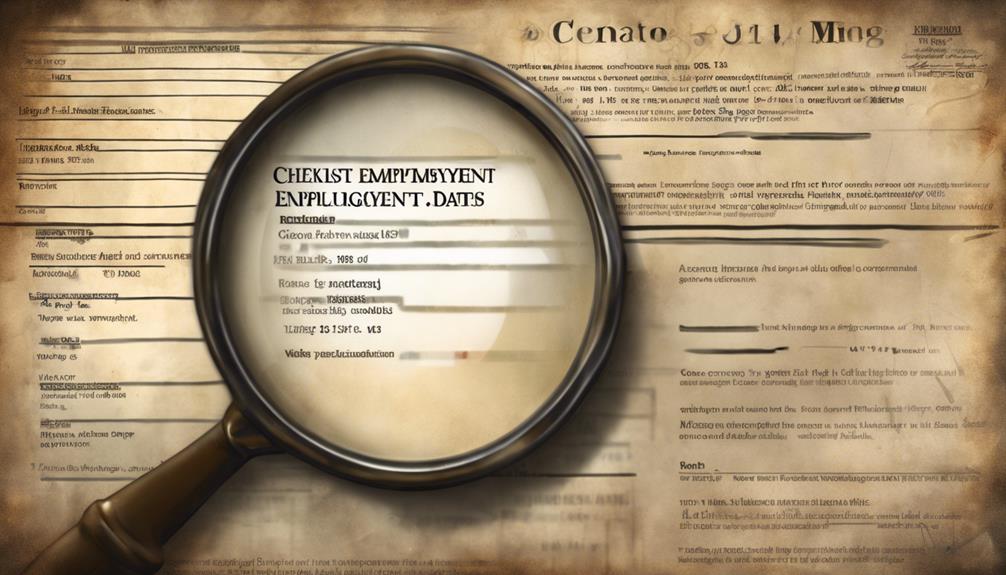Common mistakes in background checks include the absence of a formal policy and overlooking employment laws. Another error is inadequate screening of part-time employees, leading to potential risks. Proceeding without proper consent and neglecting social media screening are also common mishaps. Overreliance on automated software can result in mistaken identity risks. Denying candidates the right to correct inaccuracies and failing to gather adequate information are additional errors employers make. To learn more about these mistakes and how to avoid them, discover the importance of a robust background check policy, compliance with employment laws, and the significance of thorough screening practices.
Key Takeaways
- Skipping thorough checks due to time constraints.
- Failing to obtain candidate consent for screenings.
- Relying solely on automated systems for verifications.
- Neglecting to verify identity accurately.
- Overlooking discrepancies in reported information.
Lack of Background Check Policy

When hiring employees, a common mistake that organizations make is the absence of a formal background check policy. Without a clear policy in place for screening candidates, companies may face challenges in proving that proper background checks were conducted. This can lead to potential discrimination issues if checks aren't consistently applied to all candidates.
A robust background check policy is essential as it specifies who'll undergo screening, outlines when checks will be performed, and details how the process will be carried out. By implementing a structured policy, organizations make certain that all candidates go through the same screening process, reducing the risk of hiring individuals with undisclosed or concerning backgrounds.
Having a background check policy not only aids in selecting the right candidates but also helps in maintaining a consistent and fair hiring process across the board.
Ignorance of Employment Laws
Ignorance of employment laws can have significant implications for employers conducting background checks. Failing to grasp regulations like the Fair Credit Reporting Act can lead to legal troubles and non-compliance issues.
Understanding the importance of legal compliance is essential for creating a fair and consistent background check process.
Legal Compliance Importance
Understanding employment laws is crucial for guaranteeing legal compliance in background checks and reducing the risk of regulatory violations. One vital aspect of legal compliance in background screening is adherence to the Fair Credit Reporting Act (FCRA), a consumer protection law that governs the use of consumer information by background check companies.
The FCRA mandates that individuals must provide consent before a background check is conducted, and they have the right to dispute any inaccuracies in the report. Additionally, the law outlines what information can be included in a background check report and sets guidelines for the proper handling of consumer data.
Failing to comply with the FCRA and other employment laws can result in severe consequences for businesses, including lawsuits and financial penalties. It's essential for organizations to stay informed about state-specific laws that may impact background screening processes to guarantee full legal compliance and protect the rights of candidates.
Understanding FCRA Regulations
Employers must proactively educate themselves on the Fair Credit Reporting Act (FCRA) regulations to ensure compliance with background check procedures. Ignorance of FCRA regulations can result in common mistakes and legal consequences for employers.
To navigate this area successfully, employers should consider the following key points:
- Obtaining Candidate Consent: Employers must obtain explicit consent from candidates before conducting background checks to adhere to FCRA regulations.
- Providing Background Check Reports: FCRA mandates that candidates receive a copy of the background check report if adverse action is taken based on it.
- Compliance and Fair Treatment: Understanding FCRA regulations is vital for ensuring compliance and fair treatment of candidates throughout the background check process.
- Legal Consequences: Failing to comply with FCRA regulations can lead to potential legal repercussions for employers, making it essential to stay informed and up to date on these laws.
Screening Part-Time Employees

Screening part-time employees is vital to reduce risks associated with access to company resources and interactions with stakeholders. While some may overlook background checks for part-time workers, they pose similar risks as full-time employees. Access to company premises, sensitive information, and interactions with customers warrant thorough screening for part-time employees to uphold security standards. Additionally, vendors and contractors working closely with the company should also undergo background checks to maintain a secure work environment.
To emphasize the importance of screening all employees, including part-time workers, a thorough and consistent approach to risk management is necessary. Employment status, whether full-time or part-time, should not determine the need for background checks. By implementing screening procedures uniformly across all employee types, companies can safeguard their assets and reputation effectively.
| Part-Time Employee Screening | |
|---|---|
| Significance | Reducing Risks |
| Extent | Comparable to Full-Time |
| Uniformity | Among All Employees |
| Vendor/Contractor Incorporation | Vital |
Proceeding Without Consent
Conducting background verifications without obtaining written permission from candidates is an essential mistake that can lead to legal repercussions. The Fair Credit Reporting Act mandates that employers must have explicit authorization before running background checks, highlighting the significance of securing permission for each check conducted.
Failure to adhere to these requirements not only risks the employer's reputation but also opens the door to potential legal consequences. To guarantee a fair and compliant screening process, candidates must be informed about the checks being conducted and provide their authorization accordingly.
- Check Authorization Requirements: The law requires employers to notify candidates and seek explicit permission before running background verifications.
- Criminal Background Checks: Failure to obtain permission for criminal background verifications can have severe legal implications.
- Informing Candidates: It's vital to inform candidates about the specific types of checks being conducted and obtain their authorization for each.
- Compliance: Obtaining written permission is a fundamental step in complying with legal regulations and ensuring a transparent screening process.
Neglecting Social Media Screening

Neglecting to incorporate social media screening in the hiring process can result in missing essential insights about candidates that traditional background checks may not reveal. Employers who overlook this aspect may fail to uncover red flags or valuable information that could impact their hiring decisions significantly. With 70% of recruiters admitting to rejecting candidates based on their online presence, it is evident that social media plays a pivotal role in shaping hiring choices. However, employers must navigate this tool carefully to avoid legal repercussions and ethical dilemmas.
| Advantages of Social Media Screening | Challenges of Social Media Screening | Best Practices for Employers |
|---|---|---|
| Reveals non-job-related details | Difficulty in separating personal from professional information | Utilize third-party firms for unbiased screening |
| Provides insights not found in traditional background checks | Potential invasion of privacy concerns | Approach social media screening cautiously |
| Helps in making informed hiring decisions | Risk of discrimination based on protected characteristics | Educate hiring teams on fair and legal use of social media in screening |
Overreliance on Automated Software
Relying too heavily on automated software for background checks can compromise the accuracy and thoroughness of the screening process. While automated programs can aid in background screening, they lack the nuanced accuracy of human judgment.
To ensure reliable results, it's essential not to solely depend on automated software but to integrate human expertise into the process. Companies like ScoutLogic offer specialized expertise that can help prevent errors in automated background checks.
Human judgment plays a crucial role in verifying the accuracy of information gathered through automated software, adding a layer of reliability that technology alone can't achieve.
- Automated software lacks the accuracy of human judgment in background checks.
- While helpful, automated software shouldn't be the sole source for background screening.
- Expertise from companies like ScoutLogic can help prevent errors in automated background checks.
- Human expertise is crucial in ensuring the accuracy and reliability of background check results.
Mistaken Identity Risks

Mistaken identity risks pose a vital threat to the accuracy of background checks. Confusion arising from individuals with similar names can lead to erroneous information being associated with the wrong person.
Ensuring proper identity verification is essential in preventing misidentification issues and maintaining the integrity of background screening processes.
Identity Verification Importance
Accurate identity validation plays an essential role in ensuring dependable background check information. Mistaken identity risks can lead to inaccuracies that may impact job opportunities and reputation. The significance of robust identity validation processes can't be overstated, especially in the context of background checks.
Here are some key points to keep in mind:
- Mistakes: Errors in identity validation processes can result in mistaken identity issues.
- Identity Validation: Ensuring precise validation is vital for reliable background checks.
- Background Check Company: Employing reputable background check companies can help mitigate mistaken identity risks.
- Consumer Reporting Agencies: Utilizing consumer reporting agencies that prioritize accurate identity validation can enhance the reliability of background check information.
Preventing Misidentification Issues
To minimize the risks associated with mistaken identity in background checks, proactive measures can help prevent misidentification issues that may arise from errors in personal data or similar names.
Misidentification problems often stem from data entry errors or the presence of individuals with alike names. Mistaken identity risks can lead to the association of incorrect criminal records with the wrong person, potentially causing adverse consequences.
Common errors like mixed files or outdated information can further exacerbate misidentification issues during background checks. Resolving mistaken identity risks necessitates promptly contacting relevant reporting agencies to rectify any inaccuracies in the information.
Denying Data Correction Rights
Denial of candidates' rights to correct inaccuracies in their background checks can result in legal consequences for employers. Employers must allow candidates the opportunity to dispute and rectify any errors on their background reports.
Failure to do so not only violates the candidate's right to accurate information but also jeopardizes the fairness of the hiring process. To avoid legal repercussions and uphold ethical hiring practices, employers should prioritize granting candidates the right to correct any mistakes on their background checks.
Seeking legal advice in handling data correction requests can provide guidance on the appropriate steps to take.
Candidates have the right to dispute and correct any errors in their background check reports.
Denying data correction rights can lead to legal repercussions for employers.
Allowing candidates to correct errors promotes fairness and accuracy in the hiring process.
Failure to rectify mistakes can damage the reputation of both the candidate and the employer.
Inadequate Information Checks

Tailoring background checks to align with specific job requirements enhances the relevance and accuracy of obtained information. It is crucial for background check companies and consumers to run a background check with written consent from the individual. Failing to gather adequate information can result in crucial details being overlooked, such as criminal history or discrepancies in employment records.
| Inadequate Information Checks | Importance |
|---|---|
| Tailoring background checks to job requirements | Ensures relevance and accuracy |
| Obtaining written consent for background checks | Legal compliance and transparency |
| Including criminal history in screenings | Essential for safety and security |
Frequently Asked Questions
What Could Ruin a Background Check?
Inaccurate criminal records, mistaken identities, outdated information, errors in employment history, educational qualifications, credit reports, mixed files, lack of candidate consent, inadequate verification procedures, and reliance on incomplete databases can all ruin a background check.
What Are Some Red Flags on a Background Check?
Red flags on a background check include recent or serious criminal convictions, discrepancies in employment history, negative credit history, false educational credentials, and inconsistent information from references. Employers may view these as warning signs.
What Would Cause Me to Fail an Employment Background Check?
Not disclosing accurate credentials or hiding a criminal past can lead to failing an employment background check. It's essential to be forthright and transparent during the process to avoid any setbacks. Remember, honesty is the best policy.
Can a Background Check Make a Mistake?
Yes, a background check can indeed make a mistake. Addressing any errors promptly is vital to prevent negative repercussions. Disputing inaccuracies is important for ensuring the accuracy of the information and safeguarding one's reputation and opportunities.
Conclusion
To wrap up, conducting background checks without proper policies and knowledge of employment laws can lead to a minefield of mistakes.
It's important to tread carefully and not overlook the potential risks that come with screening employees.
Just as a gardener meticulously tends to their garden to promote healthy growth, employers must conscientiously cultivate their background check processes to avoid any damaging missteps.








